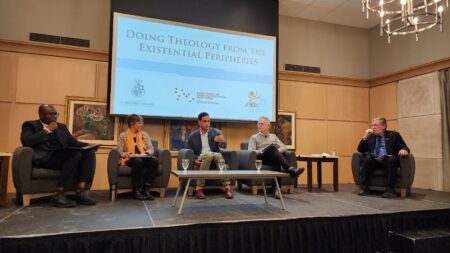The University of St. Michael’s College recently hosted the Canadian launch of the research findings from a key pillar of Pope Francis’s ongoing synodal process, work that offers a voice to those often invisible and unheard in church communities and society.
More than 300 people, including St. Michael’s Chancellor Thomas Cardinal Collins, gathered in person and online on Thursday, November 10 to hear about a report from an international theological research project, Doing Theology From the Existential Peripheries, created and overseen by the Dicastery on Promoting Integral Human Development, Holy See. The aim of the project, which has divided the world into six regions for research purposes, is to deepen the teachings of Pope Francis, as well as to renew theology by listening to those on the margins of society and of the church.

Taking part in the discussion at St. Michael’s were two members of the North American research team: panel lead and St. Michael’s alumnus Fr. Stan Chu Ilo, of Chicago’s De Paul University, and Dr. Darren Dias, OP, a member of St. Michael’s Faculty of Theology and the executive director of the Toronto School of Theology.
Two of the dozens of participants interviewed for the project also sat on the event panel, sharing their experiences: Mary Ellen Chown, a member of the Canadian Network for Women’s Equality (CNWE), and Carl O’Byrne, a coordinator of All Inclusive Ministries
The project began as a response to COVID, seeking input from parishes on the impact the pandemic was having, but Fr. Ilo noted that it was a conversation that couldn’t be had without noting the walls that exist in the church, including those related to gender, sexuality, and socioeconomic stature, and thus the project became a study in creating a depolarizing space, a way to address questions such as racism in the church.
Quoting a participant who was interviewed in Mexico, he said, “The church should never give up on anyone,” adding, “we must embrace the culture of encounter in order to break the walls that are rising in the world today. …Who are those who are not at the table?”
Dias explained the methodology used by the reseach team to the crowd, noting that each of the six teams was to identify the particular ways in which people were marginalized in their part of the world. For the North American team, discussions included meetings with Indigenous people, those in holding centres on the US-Mexico border, people in prisons, member of LGBTQI2S communities, the poor, women excluded from church office, and refugees and migrants, were an exercise in listening to help theologians learn “how we draw people out of their imposed invisibility.”
“What are the questions that arise?” he asked, noting that rather than being akin to “an echo chamber” the process was to hear from those who often don’t have a voice, thus helping to move the church closer to the task of theology, which is to help name grace. Part of the responsibility of a Catholic university, he added, is to listen, including to opposing views, as it is through listening that key insights can be gained in order to shape a theological agenda that is relevant to people’s experience.
Chown referenced the work of the late Dr. Margaret Ellen Leonard, CSJ, USMC professor emerita and co-founder of CNWE, who considered the experiences of women in the Catholic church as a source for doing theology. Chown also spoke to the ways in which the exclusion of women from ministry and leadership in the Church impoverishes the whole church. She said that the members of the CNWE focus group find hope in continuing to advocate for church reform. Through this project, and the Vatican synodal process, they hear Wisdom calling Catholics to a radically new way of ‘being church.’
Quoting Dr. Leonard, she said, “The reality of our lives is fertile ground for theology.”
Speaking of the value of respect, compassion and sensitivity, O’Byrne said that while members of the LGBTQ community would “like to think we are not on the periphery” many see themselves as outliers, even though “we’re here, and we’re going to stay.”
The North American report has now been received by the Vatican. Fr. Ilo noted that when people involved with the project met with him, Pope Francis’s message was simple but direct: “Keep moving forward. All will be well.”
- Final reports from the peripheries project are available online: https://migrants-refugees.va/resource-center/publications.
- The panel discussion is available on YouTube: https://youtu.be/yRA7WeoBv2M
The University of St. Michael’s College is planning for related events in the coming months. Please check our website, stmikes.utoronto.ca, for information about future events.
